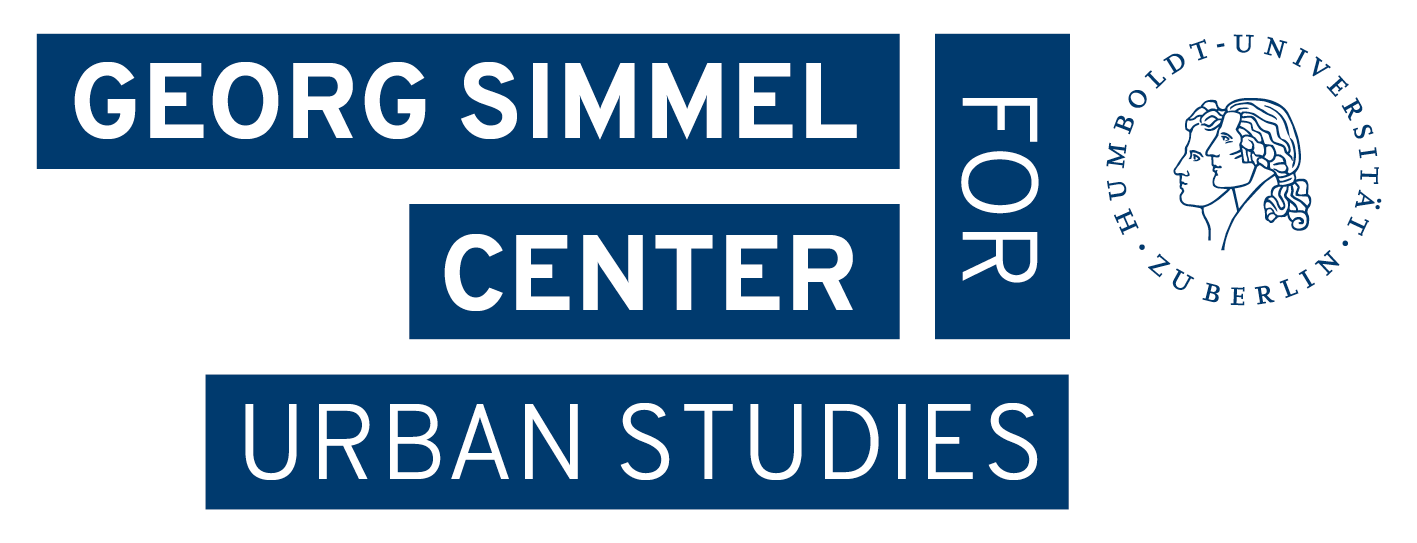About us
The Georg-Simmel Center for Metropolitan Studies (GSZ) is an interdisciplinary platform at the Humboldt University for urban and metropolitan research. The GSZ coordinates activities on investigation and academic formation in three different levels: internally, in the university, locally, in Berlin, and internationally, in cooperation with different stakeholders. Our aim is to contribute the public debates with an interdisciplinary perspective on the future development of Metropolises.
Our Mission
Two intellectual anchors
The GSZ stands for urban research that combines and balances various standpoints on urban phenomena and transformations. In our recent history, the various ways in which gentrification, tourism and urban ecology, heritage industries, housing, urban education, urban poverty, and migrant movements had been of interest to us shared an underlaying sense that claims and rights to the city produced a tension of entitlement.
Urban citizenship as expressing, if not producing, difference, and fragmentation of claims affects rights to the city as universal, all-inclusive ideals (Blokland et al. 2015). We registered a trend towards a diversification of interests, a weakening of movements, and even a competition over rights and resources rather than a development of mutual solidarities among various groups on the pathway to a livable city. Urban citizenship is always relational to modes of governance. Inspired by James Scott’s “Seeing Like a State”, our work aims at studying various modes and scales of governing the urban, paying particular attention to the ‘City’ as a set of local state institutions that imagine, regulate, categorize, classify, and intervene the urban and shape current forms of citizenship and belonging. But the city cannot be made nor planned and will always be, as formulated by Abdu-Maliq Simone, in the making through practices and logics outside of the view of the state which defy standards and categories, city politics must draw boundaries and categorize, as any political decision implies a categorization. The two anchors of the program of the GSZ were developed to address this tension. These anchors – ‘seeing like a city’ and ‘seeing the city through’ – have been developed in our theoretical contributions to the field and inform most of our research in our thematic clusters.
First anchor: Seeing like a City
The ways of developing cities and urban infrastructures have long held a promise of planning and policy as if with ‘right’ planning and ‘right’ policy, the sustainable city, the city of justice, the cohesive city or the resilient city could be planned and implemented. While urban studies critical scholarship has long since put aside this idea, urban governance practices and policy implementations draw strongly on implicit thoughts of the city to be ‘made’. Taking this into account, we are interested in studying how ‘seeing like a city’ not only reduces the complexity of the urban, but also how it creates new complexities and interstices.
Second Anchor: Seeing the City Through
Our work also aims to understand how people’s everyday practices and infrastructures bring the city about as unintended, unplanned, and ordinary forms of the urban. This focus makes apparent the need for de-centralized and de-centered forms of seeing and listening the city through, complementing understandings of cities as made-up of demographics and other forms of number-based knowledge. This studying the resistance, overflows and ungovernability of nonhuman elements of urban assemblages such as materials, animals, and climates. Incremental learning, multiple forms of reading, performativity and non-representational forms of theorizing are all examples of this theoretical lens.
______________
Scott, J. (1999) Seeing like a State. New Haven: Yale University Press.
Simone, A. (2004) For the City Yet to Come: Changing African Life in Four Cities. Durham: Duke University Press.
Blokland, T., Hentschel, C., Holm, A., Lebuhn, H. & Margalit, T. (2015) Urban Citizenship and Right to the City: The Fragmentation of Claims: URBAN CITIZENSHIP AND RIGHT TO THE CITY.” International Journal of Urban and Regional Research 39(4):655–65.
Topics
- Cultural Heritage
- Emotions and the City
- Infrastructures and Urban Development
- Methods of Urban Research
- Performative Urbanity
- Public Space
- Urban Ecology
- City and Tourism
- Theory/Basics of Urban Research
- Inequality and Segregation
- Urban Citizenship and Migration
- Urban Culture
- Urban Politics
- Urban Health & Care
- Housing
- Work and the City
- Civil Society
Our Work
- Initiation and coordination of research projects, including knowledge transfer through conferences, workshops, lectures and colloquia.
- Assistance and Fostering for graduate, doctoral and post-doctoral students, with ideal and financial support for example through short scholarships and international Summer Schools at the GSZ (in planning)
- Specialized publications in the field of urban studies, in academic and popular journals and also in other editorial formats, publication of outstanding theses (in planning)
- Academic formation at the Humboldt-University and other universities in Berlin. See our directory for more information.
- Knowledge transfer: Organisation of the weekly Think & Drink lecture series with subsequent discussion.
- Newsletter: we share information about different events and publications around urban research, as well as activities at the GSZ.
Centre Structure
Executive Director
Prof. Dr. Talja Blokland (Department of Urban and Regional Sociology)
Dr. Heike Oevermann (Vice executive director)
Council
Supporter of the Georg-Simmel Center
The following Institutes of the Humboldt-Universität zu Berlin support the Georg-Simmel Center financially (in alphabetical order):
Department of European Ethnology
Members
Department of Cultural History and Theory
Department of Art and Visual History
Department of Romance Literatures and Linguistics
Department of German Literature
Department of Computer Science
Research Groups
Urban Research Group: Urban Commons
Markus Kip (markus.kip@gsz.hu-berlin.de)
Urban Research Group: NYLON Berlin
Helen Gibson (gibson@gsnas.fu-berlin.de)
Urban Research Group: New Urban Tourism
Christoph Sommer (christoph.sommer@gsz.hu-berlin.de)
Urban Research Group: Work and the City
Nina Margies (nina.margies (at) sowi.hu-berlin.de)
Urban Ethnography Lab
Carolin Genz (carolin.genz@hu-berlin.de)
Students' Research Group
Nicolas Goez (goeznicolas@gmail.com)
Associated Networks
The Artist and the City (Dr. Eszter Gantner)
stadt:gestalten. netzwerk junger urbanist_innen (Lisa Frach)
TACT - International Research on Art and City
